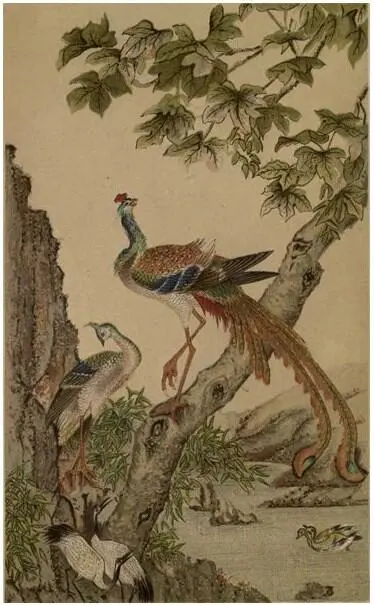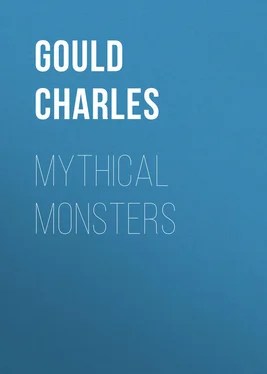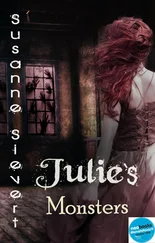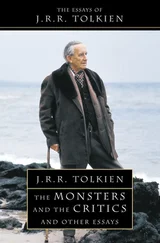Charles Gould - Mythical Monsters
Здесь есть возможность читать онлайн «Charles Gould - Mythical Monsters» — ознакомительный отрывок электронной книги совершенно бесплатно, а после прочтения отрывка купить полную версию. В некоторых случаях можно слушать аудио, скачать через торрент в формате fb2 и присутствует краткое содержание. Жанр: Мифы. Легенды. Эпос, Природа и животные, foreign_antique, foreign_prose, на английском языке. Описание произведения, (предисловие) а так же отзывы посетителей доступны на портале библиотеки ЛибКат.
- Название:Mythical Monsters
- Автор:
- Жанр:
- Год:неизвестен
- ISBN:нет данных
- Рейтинг книги:5 / 5. Голосов: 1
-
Избранное:Добавить в избранное
- Отзывы:
-
Ваша оценка:
- 100
- 1
- 2
- 3
- 4
- 5
Mythical Monsters: краткое содержание, описание и аннотация
Предлагаем к чтению аннотацию, описание, краткое содержание или предисловие (зависит от того, что написал сам автор книги «Mythical Monsters»). Если вы не нашли необходимую информацию о книге — напишите в комментариях, мы постараемся отыскать её.
Mythical Monsters — читать онлайн ознакомительный отрывок
Ниже представлен текст книги, разбитый по страницам. Система сохранения места последней прочитанной страницы, позволяет с удобством читать онлайн бесплатно книгу «Mythical Monsters», без необходимости каждый раз заново искать на чём Вы остановились. Поставьте закладку, и сможете в любой момент перейти на страницу, на которой закончили чтение.
Интервал:
Закладка:
Charles Gould
Mythical Monsters

THE FUNG WANG.
ACCORDING TO
FANG HENG.
PREFACE
The Author has to express his great obligations to many gentlemen who have assisted him in the preparation of this volume, either by affording access to their libraries, or by furnishing or revising translations from the Chinese, &c.; and he must especially tender them to J. Haas, Esq., the Austro-Hungarian Vice-Consul at Shanghai, to Mr. Thomas Kingsmill and the Rev. W. Holt of Shanghai, to Mr. Falconer of Hong-Kong, and to Dr. N. B. Dennys of Singapore.
For the sake of uniformity, the author has endeavoured to reduce all the romanised representations of Chinese sounds to the system adopted by S. W. Williams, whose invaluable dictionary is the most available one for students. No alteration, however, has been made when quotations from eminent sinologues like Legge have been inserted.
Should the present volume prove sufficiently interesting to attract readers, a second one will be issued at a future date, in continuation of the subject.
June, 1884.
The Publishers think it right to state that, owing to the Author’s absence in China, the work has not had the advantage of his supervision in its passage through the press. It is also proper to mention that the MS. left the Author’s hands eighteen months ago.
13, Waterloo Place. S.W.
January, 1886.
INTRODUCTION
It would have been a bold step indeed for anyone, some thirty years ago, to have thought of treating the public to a collection of stories ordinarily reputed fabulous, and of claiming for them the consideration due to genuine realities, or to have advocated tales, time-honoured as fictions, as actual facts; and those of the nursery as being, in many instances, legends, more or less distorted, descriptive of real beings or events.
Now-a-days it is a less hazardous proceeding. The great era of advanced opinion, initiated by Darwin, which has seen, in the course of a few years, a larger progress in knowledge in all departments of science than decades of centuries preceding it, has, among other changes, worked a complete revolution in the estimation of the value of folk-lore; and speculations on it, which in the days of our boyhood would have been considered as puerile, are now admitted to be not merely interesting but necessary to those who endeavour to gather up the skeins of unwritten history, and to trace the antecedents and early migrations from parent sources of nations long since alienated from each other by customs, speech, and space.
I have, therefore, but little hesitation in gravely proposing to submit that many of the so-called mythical animals, which throughout long ages and in all nations have been the fertile subjects of fiction and fable, come legitimately within the scope of plain matter-of-fact Natural History, and that they may be considered, not as the outcome of exuberant fancy, but as creatures which really once existed, and of which, unfortunately, only imperfect and inaccurate descriptions have filtered down to us, probably very much refracted, through the mists of time.
I propose to follow, for a certain distance only, the path which has been pursued in the treatment of myths by mythologists, so far only, in fact, as may be necessary to trace out the homes and origin of those stories which in their later dress are incredible; deviating from it to dwell upon the possibility of their having preserved to us, through the medium of unwritten Natural History, traditions of creatures once co-existing with man, some of which are so weird and terrible as to appear at first sight to be impossible. I propose stripping them of those supernatural characters with which a mysteriously implanted love of the wonderful has invested them, and to examine them, as at the present day we are fortunately able to do, by the lights of the modern sciences of Geology, Evolution, and Philology.
For me the major part of these creatures are not chimeras but objects of rational study. The dragon, in place of being a creature evolved out of the imagination of Aryan man by the contemplation of lightning flashing through the caverns which he tenanted, as is held by some mythologists, is an animal which once lived and dragged its ponderous coils, and perhaps flew; which devastated herds, and on occasions swallowed their shepherd; which, establishing its lair in some cavern overlooking the fertile plain, spread terror and destruction around, and, protected from assault by dread or superstitious feeling, may even have been subsidised by the terror-stricken peasantry, who, failing the power to destroy it, may have preferred tethering offerings of cattle adjacent to its cavern to having it come down to seek supplies from amongst their midst. 1 1 This tributary offering is a common feature in dragon legends. A good example is that given by El Edrisi in his history of the dragon destroyed by Alexander the Great in the island of Mostachin (one of the Canaries?).
To me the specific existence of the unicorn seems not incredible, and, in fact, more probable than that theory which assigns its origin to a lunar myth. 2 2 The latest writer on this point summarizes his views, in his opening remarks, as follows: – “The science of heraldry has faithfully preserved to modern times various phases of some of those remarkable legends which, based upon a study of natural phenomena, exhibit the process whereby the greater part of mythology has come into existence. Thus we find the solar gryphon, the solar phœnix, a demi-eagle displayed issuing from flames of fire; the solar lion and the lunar unicorn, which two latter noble creatures now harmoniously support the royal arms. I propose in the following pages to examine the myth of the unicorn, the wild, white, fierce, chaste, moon, whose two horns, unlike those of mortal creatures, are indissolubly twisted into one; the creature that endlessly fights with the lion to gain the crown or summit of heaven, which neither may retain, and whose brilliant horn drives away the darkness and evil of the night even as we find in the myth, that Venym is defended by the horn of the unicorn.” — The Unicorn; a Mythological Investigation. Robert Brown, jun., F.S.A. London, 1881.
Again, believing as I do in the existence of some great undescribed inhabitant of the ocean depths, the much-derided sea-serpent, whose home seems especially to be adjacent to Norway, I recognise this monster as originating the myths of the midgard serpent which the Norse Elder Eddas have collected, this being the contrary view to that taken by mythologists, who invert the derivation, and suppose the stories current among the Norwegian fishermen to be modified versions of this important element of Norse mythology. 3 3 “The midgard or world-serpent we have already become tolerably well acquainted with, and recognise in him the wild tumultuous sea. Thor contended with him; he got him on his hook, but did not succeed in killing him. We also remember how Thor tried to lift him in the form of a cat. The North abounds in stories about the sea-serpent, which are nothing but variations of the original myths of the Eddas. Odin cast him into the sea, where he shall remain until he is conquered by Thor in Ragnarok.” — Norse Mythology , p. 387. R. B. Anderson, Chicago, 1879.
I must admit that, for my part, I doubt the general derivation of myths from “the contemplation of the visible workings of external nature.” 4 4 Vide Anderson.
It seems to me easier to suppose that the palsy of time has enfeebled the utterance of these oft-told tales until their original appearance is almost unrecognisable, than that uncultured savages should possess powers of imagination and poetical invention far beyond those enjoyed by the most instructed nations of the present day; less hard to believe that these wonderful stories of gods and demigods, of giants and dwarfs, of dragons and monsters of all descriptions, are transformations than to believe them to be inventions. 5 5 Just as even the greatest masters of fiction adapt but do not originate. Harold Skimpole and Wilkins Micawber sat unconsciously for their portraits in real life, and the most charming characters and fertile plots produced by that most prolific of all writers, A. Dumas, are mere elaborations of people and incidents with which historical memoirs provided him.
Интервал:
Закладка:
Похожие книги на «Mythical Monsters»
Представляем Вашему вниманию похожие книги на «Mythical Monsters» списком для выбора. Мы отобрали схожую по названию и смыслу литературу в надежде предоставить читателям больше вариантов отыскать новые, интересные, ещё непрочитанные произведения.
Обсуждение, отзывы о книге «Mythical Monsters» и просто собственные мнения читателей. Оставьте ваши комментарии, напишите, что Вы думаете о произведении, его смысле или главных героях. Укажите что конкретно понравилось, а что нет, и почему Вы так считаете.











